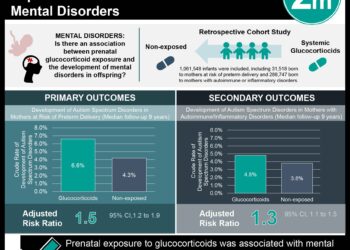Topical steroid use in pregnancy not associated with adverse birth outcomes
Image: PD
1. Overall, no association was found between maternal exposure to topical steroids during pregnancy and adverse birth outcomes.
2. When stratified by steroid dose, there was an association between pregnant women exposed to large amounts of topical steroids and low infant birth weight.
Evidence Rating Level: 2 (Good)
Study Rundown: This study found that women who used topical steroids during pregnancy were at no increased risk for a number of adverse birth outcomes, including preterm delivery, low Apgar scores, orofacial cleft or fetal death. Yet, when stratified by steroid dose, women who required >300g of potent or very potent topical steroids in pregnancy were significantly more likely to have low birth weight infants.
A major strength of this study is employment of a large, population-based sample. Findings are limited by retrospective design and use of a surrogate marker of exposure. In this study, compliance with prescribed topical steroids and use of over-the-counter topical steroid use was not determined such that actual use was unknown. Moreover, analyses did not differentiate between dermatologic disorders necessitating steroids such that the severity of conditions necessitating treatment may vary broadly, creating potential for heterogeneity in the exposure group that may bias results toward null. A prospective comparison of women who used topical steroids in pregnancy to matched controls (women with the same dermatologic condition) who did not use topical steroids in pregnancy would provide insight. Additional outcomes measures, such as IUGR (SGA at birth), might also be assessed.
Click to read the study in JAMA Dermatology
Relevant Reading: Uptodate: General Principles of Dermatologic Therapy and Topical Corticosteroid Use
Study Author, Dr. Dr Ching-Chi Chi, MD, MMS, DPhil talks to 2 Minute Medicine: Director and Associate Professor, Department of Dermatology, Chang Gung Memorial Hospital, Taiwan
“The information from this article will hopefully lead to the safer use of topical steroids in pregnancy. [Our findings suggest that] in pregnant women with skin conditions, mild or moderate topical steroids are the preferred treatment. When potent or very potent topical steroids are needed, the amount used should be kept to a minimum, and fetal growth should be monitored.”
In-Depth [population-based cohort study]: This retrospective study out of Scotland identified pregnant women from 1989-2006 who filled a prescription for topical corticosteroids in pregnancy (n=2,658) and time-matched unexposed controls (n=7,246). Primary outcome was the incidence of adverse pregnancy outcomes, specifically low birth weight (<2500 g), preterm delivery (<37 weeks gestational age), low Apgar score (<7 at 5 min), orofacial cleft and fetal death. Secondary analyses stratified by steroid potency and cumulative dose.
Primary analyses identified no increased risk for preterm delivery, low birth weight, low Apgar score, orofacial cleft or fetal death in women with any exposure to topical corticosteroids in pregnancy compared to women with no exposure. When stratified by potency, women receiving >300g of potent or very potent topical corticosteroids over the course of the entire pregnancy were significantly more likely to have infants with low birth weight than women with no exposure (RR=7.74, p=.02)
By Maren Shapiro and Leah Hawkins, MD, MPH
More from this author: IUD contraception equally safe in teenagers as in older women, Black men less likely to receive follow-up for elevated prostate cancer marker, PSA, Intake of fish fatty acids associated with lower risk of breast cancer, USPSTF recommends chemoprevention for women at high risk for breast cancer, Insurance status affects treatment of early stage breast cancer, SERMs decrease breast cancer risk even after treatment
© 2013 2minutemedicine.com. All rights reserved. No works may be reproduced without expressed written consent from 2minutemedicine.com. Disclaimer: We present factual information directly from peer reviewed medical journals. No post should be construed as medical advice and is not intended as such by the authors, editors, staff or by 2minutemedicine.com. PLEASE SEE A HEALTHCARE PROVIDER IN YOUR AREA IF YOU SEEK MEDICAL ADVICE OF ANY SORT.







